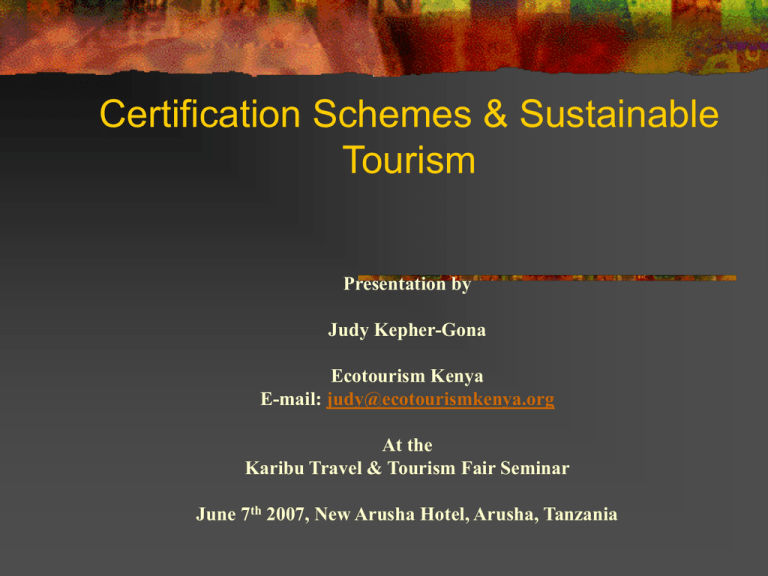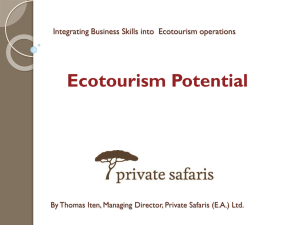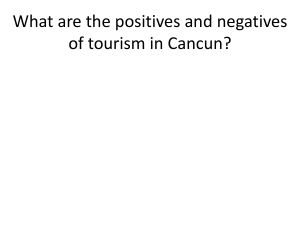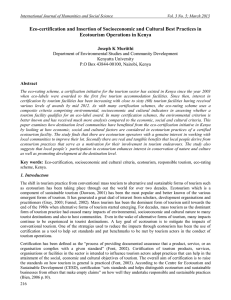Presentation by Judy Kepher-Gona
advertisement

Certification Schemes & Sustainable Tourism Presentation by Judy Kepher-Gona Ecotourism Kenya E-mail: judy@ecotourismkenya.org At the Karibu Travel & Tourism Fair Seminar June 7th 2007, New Arusha Hotel, Arusha, Tanzania Overview of Certification Schemes in Tourism Industry Leading region Europe Geographical scope National/regional/global Consumption Average- slower than demand for ecotourism. Sectors covered Accommodation & tour operations Self assessment+ third party Assessment Through audits Management NGOs/Govt departments/private sector /industry associations Financing Fees, government, NGOs,donor support. Regulatory status Voluntary+ quasi-mandatory Motivation to participate Desire to be responsible, investment incentives, preferential promotion Identification Logos/labels (symbols) 2 About Kenya’s Eco-rating scheme Name Of Scheme Eco-rating Scheme Launched 2003 Management Ecotourism Kenya/Ecorating Committee Assessment Audits Levels of Certification Three: Bronze, Silver & Gold Criteria Environmental, social and economic What is certified? Business or product? The product (incorporating the business) Regulatory status Voluntary Sector Covered Accommodation Number of certified properties to date 35 Finance Eco-rating fees Support provided Technical & Promotion 3 Key Questions that guided Kenya’s decision (the model) 4 Does the scheme have to be Kenyan What should be the focus of the scheme What approach to assessment would be desirable? What criteria should be used Should there be different levels of certification Who should manage the scheme How will compliance to ensured What support should scheme offer to participants? Guiding principles of a good scheme- (Overall framework ) Objectives clearly stated. Developed through a participatory process Should provide tangible benefits to tourism providers and a means for tourists to chose wisely. Should provide tangible benefits to local communities and to conservation. 5 Overall Framework cont. 6 Set minimum standards while encouraging and rewarding best practice. Include a process to withdraw certification in the event of non-compliance. Establish control of seals/logos Provision for technical assistance Motivation towards continual improvement - both of the scheme and of the products/companies/bodies to be certified. Good Criteria 7 meet and preferably exceed regulatory compliance. embody global best practice in environmental, social and economic management. adapted to recognizing local/regional ecological, social and economic conditions and local sustainable development efforts. subject to a periodic review. be principally performance-based and include environmental, social and/or economic management process elements. Scheme integrity 8 The certification program should be transparent and involve an appeals process. The certification body should be independent of the parties being certified and of technical assistance and assessment bodies (i.e., administrative structures for technical assistance, assessment and auditing should avoid conflicts of interest). The scheme should require audits by suitably trained auditors. The scheme should require consumer and local community feedback mechanisms. Sustainable Tourism Criteria In any certification scheme, the criteria used to define sustainable tourism should address at least minimum standards in the following aspects (as appropriate): 9 Environmental planning and impact assessment, considering social, cultural, ecological and economic impacts (including cumulative impacts and mitigation strategies); Sustainable Tourism Criteria Environmental management commitment by tourism business; Staff training, education, responsibility, knowledge and awareness in environmental, social and cultural management; Mechanisms for monitoring and reporting environmental performance; Accurate, responsible marketing leading to realistic expectations; and A requirement for tourism businesses to obtain consumer feedback regarding quality of the 10 tourism experience. Social/Cultural Criteria 11 Impacts upon social structures, culture and economy (on both local and national levels) Appropriateness of land acquisition/access processes and land tenure; Measures to protect the integrity of local community’s social structure; and Mechanisms to ensure rights and aspirations of local and/or indigenous people are recognized. Ecological Criteria 12 Appropriateness of location and sensitivity towards sense of place; Biodiversity conservation and integrity of ecosystem processes; Site disturbance, landscaping and rehabilitation; Drainage, soils and storm water management; Sustainability of energy supply and minimization of use; Sustainability of water supply and minimization of use; Ecological Criteria cont. Sustainability of wastewater treatment and disposal; Noise and air quality (including greenhouse emissions); Waste minimization and sustainability of disposal; Visual impacts and light; Sustainability of materials and supplies (recyclable and recycled materials, locally produced, certified timber products etc.); Minimal environmental impacts of activities. 13 Economic Considerations Requirements for ethical business practice; Mechanisms to ensure labor arrangements and industrial relations procedures are not exploitative, and conform to local laws or international labor standards (which ever are higher); Mechanisms to ensure that negative economic impacts on local communities are minimized and preferably there are substantial economic benefits to local communities; Requirements to ensure contributions to the 14 development/ maintenance of local community Elements of a successful certification scheme 15 Negotiated by stakeholders Performance based Third party independent assessment Provides a branding seal Financial self sufficiency Market-based campaigns by advocacy groups Government/state support Critical issues facing Certification Schemes 16 Finances Credibility (standards/ management) Marketing/promotion (disjointed/ by who) Challenges of what should be certified (business/product?/ sustainable tourism or ecotourism) Slow uptake by businesses and consumers Brand values Is Certification Desirable? YES! 17 It is a guarantee to consumers. Motivates businesses to be embrace good practices. A demonstration of being a responsible sector/industry. Globally, there is a move towards self regulation & environmental accountability Reducing burden of policing on governments. Asante sana www.ecotourismkenya.org








![Ecotourism_revision[1]](http://s2.studylib.net/store/data/005398532_1-116d224f2d342440647524cbb34c0a0a-300x300.png)
